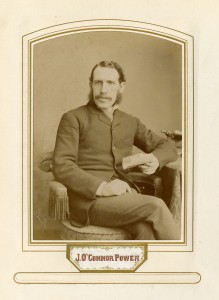In 1877, William Gladstone, now in Opposition, paid a private visit to Ireland. He arrived 17th October and left 12th November. He stayed at Killruddery House, outside Bray, County Wicklow. His host, a former Liberal MP, was William Brabazon, 11th Earl of Meath.
Gladstone took time to visit the Cripples Home in Bray.
Three months earlier, 18th July, O’Connor Power had written to Gladstone, asking him to support a motion for the release of Fenian political prisoners. Power moved the motion in the House of Commons 20th July.*
A week before Christmas, 19th December, Michael Davitt was released. Fellow prisoners were given their freedom three weeks later. They travelled to Dublin and, on 14th January, called on O’Connor Power at his lodgings and thanked him for his ‘unceasing exertions on behalf of prisoners’.
*See That Irishman, pps. 61, 62.
 Westminster Portrait, 1877. O’Connor Power is holding a letter from Michael Davitt in Dartmoor Prison which he read aloud in the House of Commons.
Westminster Portrait, 1877. O’Connor Power is holding a letter from Michael Davitt in Dartmoor Prison which he read aloud in the House of Commons.